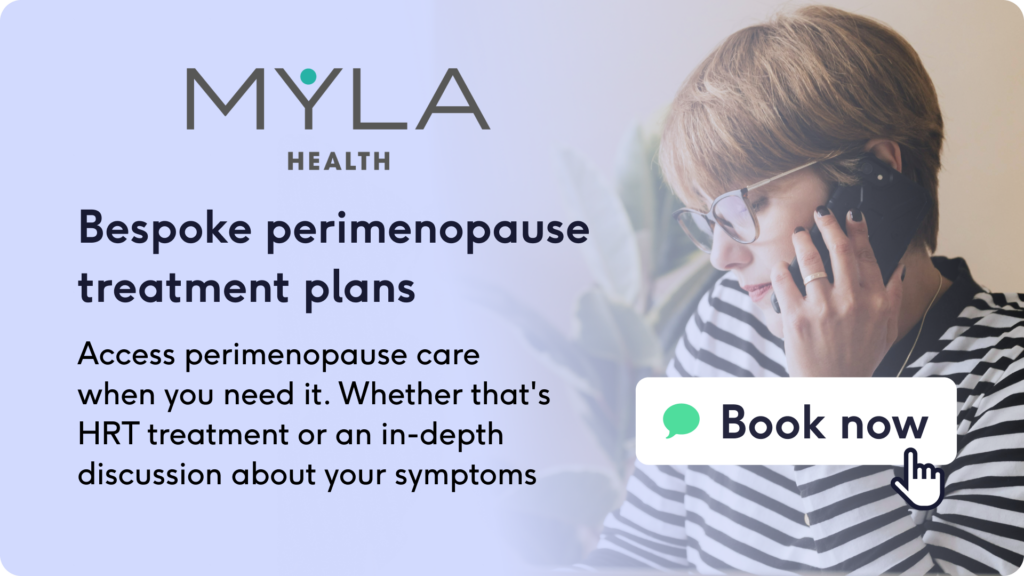
How to prepare for your first perimenopause appointment
Seeing a healthcare professional can be really daunting, especially for perimenopause. There are many stories about women not being listened to, or leaving the appointment unsatisfied. However, we know there are literally thousands of incredible healthcare professionals out there who are doing great things.
Here, we will help guide you in preparing for this important first appointment so you can get the most out of it.
How do I know if I am in perimenopause?
Perimenopause is a collection of multiple symptoms. Some women may experience nearly each and every symptom, others may only have a couple. 1 in 4 won’t get any symptoms at all! There are at least 34 symptoms of perimenopause, so it can be difficult to work out what’s going on.
Two pieces of advice that may appear conflicting but are vitally important…..
- Log and track your symptoms. Many women in perimenopause don’t realise because it’s hard to notice how all the changes happening to your body are related. There may not be any particular pattern as symptoms can come and go in varying intensities. Using a symptom tracker or diary can be a great place to start.
- Don’t put every symptom down to perimenopause. Some symptoms of perimenopause, such as palpitations and joint pain, can be signs of other medical problems. Please don’t ignore these if something just doesn’t feel right, flag these symptoms with your healthcare professional.
When is it best to book an appointment?
This is a personal choice. You can book an appointment if you feel that symptoms are starting to affect your quality of life, or if you are interested in discussing treatment options such as medications or HRT.
As above, it is also really important that you book an appointment urgently if you develop symptoms that may be a sign of other medical problems, including change in bowel habit, weight loss and vaginal bleeding after sex or in between periods, please don’t put these simply down to perimenopause.
Who shall I book in with?
Many GP practices will have a professional who is more interested and experienced in women’s health or perimenopause and HRT. Ask the reception staff, they will know. You may find it is a slightly longer wait to see the right professional. But it is often worth it for a more thorough consultation where hopefully all your questions will be answered within the time slot.
What should I know about for a perimenopause appointment?
I would always advise doing some research before an appointment. You don’t need to become a medical expert, but having a brief understanding of what perimenopause is and what treatment options are available can help speed up an appointment.
However, it is really crucial to do your research in the right place. At The Lowdown, all our information is medically reviewed and we try our best to answer the questions that our users are asking. Our perimenopause FAQs are a great place to start….and if you have any other questions you’d like us to answer, please get in touch on hello@thelowdown.com.
What will a doctor ask about during your perimenopause appointment?
Firstly, we want to know about your symptoms. This is where a symptom tracker is really important. We will want to know:
- What symptoms you have
- When they started
- How they are affecting your life, work and relationships
- What are the most distressing symptoms for you – is it hot flushes, joint pain or libido?
Next, and this is really important for doctors, we will check all your symptoms to make sure there is nothing worrying and screen for any other medical problems. If we are concerned about any symptoms, we may stop discussing perimenopause and concentrate on that for the rest of the appointment.
This can be confusing, and sometimes we might not explain ourselves well enough. If this happens with my patients, I am not dismissing your concerns about perimenopause, I am ensuring that I am not missing a more dangerous health problem such as cancer or heart disease. Doctors could arrange further investigations or tests at this point, BUT, this does not mean you can’t discuss perimenopause again. Please, book another appointment and we will help.
After screening your symptoms, many doctors will also check your medical history and overall health. It’s a good opportunity for us to check your blood pressure, any recent bloods, BMI and if you are up to date with cervical and breast screening (as appropriate). Then we can move onto the next step!
Then, we want to know what you would like to do with this appointment:
- Do you just want to confirm you’re in perimenopause?
- Would you like to start treatment today?
- What treatment are you most interested in or would you like us to explain each of them?
Now we’ve been through all of these points, we need to check the time! If 10-15 minutes have already passed, I will often send a patient away with some “homework” or reading about their chosen treatment options. I will arrange a follow up appointment or phone call to agree on the treatment plan and prescribe it in the next 1 to 2 weeks. In an ideal world, this would all be done within one appointment, but often the NHS time constraints don’t allow it. By splitting the appointment into two, this ensures we can make sure everything is medically safe and get your diagnosis and treatment plan right first time.
Do I need any more appointments?
If you have been started on HRT, we will review the type and dose of HRT after 3 months of use. This helps us to check if your symptoms are improving and identifies any side effects or issues. When you are happy and feel stable on an HRT regimen, you will have a check up every 12 months, which may be with a pharmacist or nurse, to screen for any problems, check your overall health and switch your regimen if needed.
Are blood tests needed to diagnose perimenopause? Any other investigations needed?
Women often ask me for blood tests for perimenopause. However, they are not needed and don’t help with diagnosis of perimenopause.
A hormone called FSH becomes high when a woman is postmenopausal (12 months after your periods have stopped). However, during perimenopause the FSH level can vary hugely up and down so isn’t a reliable test. We diagnose perimenopause based on your symptoms.
There are exceptions, however. In women with perimenopausal symptoms under the age of 40, and sometimes for women between the ages of 40 and 45, we will do an FSH test to support our clinical diagnosis.
Additionally, if you are over 50 years old and using the implant, hormonal coil or progestogen only pill (which can stop your periods), an FSH level can be checked. If it is raised then you can safely stop contraception after one more year. If the FSH level is in the premenopausal range you will be advised to continue contraception and have the level checked again in another year. Alternatively you can continue contraception until the age of 55 when we advise it is safe for most women to stop contraception, even if they are still having periods. No other investigations are needed for perimenopause. But I might organise other blood tests to rule out other medical problems such as arthritis, vitamin deficiency, thyroid problems or arrange an ECG heart tracing for palpitations. This is part of doctors being safe and ensuring we have checked everything out!
What if my doctor doesn’t listen?
Healthcare professionals are here to help, but we are human and don’t always get it right. I can remember certain days when I’ve been ill or stressed and I haven’t been the best doctor I can be. But we still are here to help and we want to. Yes, women’s health is still far behind where it should be, but there are thousands of healthcare professionals trying to fight for improvements.
If you feel that you have been dismissed or not had the appointment you were hoping for, you can always book in with another doctor for a second opinion. Failing that, you can switch GP practice and find another one!

Our medical review process
This article has been medically reviewed for factual and up to date information by a Lowdown doctor.







